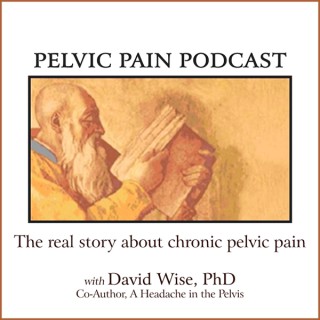Pelvic Pain Podcast|The Real Story About Chronic Pelvic Pain
Follow Pelvic Pain Podcast|The Real Story About Chronic Pelvic PainThis podcast is about muscle-related pelvic pain in men and women. Dr. David Wise, co-author of the groundbreaking book “A Headache in the Pelvic,” discusses the frequent misunderstanding and mistreatment of chronic pelvic syndromes, and the relationship between anxiety and pelvic pain. Dr. Wise, w…
- May 1, 2025 LATEST EPISODE
- infrequent NEW EPISODES
- 10m AVG DURATION
- 48 EPISODES
Latest episodes from Pelvic Pain Podcast|The Real Story About Chronic Pelvic Pain

For treating: prostatitis, chronic pelvic pain syndrome, pelvic floor dysfunction, pudendal neuralgia, levator ani syndrome, perineal pain, sitting pain, chronic pelvic pain

From PelvicPainHelp.com

The Wise-Anderson Protocol significantly reduces symptoms of chronic pelvic pain syndrome in a majority of those who practice it (study)
The Wise-Anderson Protocol significantly reduces symptoms of chronic pelvic pain syndrome in a majority of those who practice it (study) (including pelvic floor dysfunction, including pelvic floor dysfunction, prostatitis/cpps, chronic pelvic pain syndrome, prostatodynia, levator ani syndrome, pudendal neuralgia, pelvic floor hypertonia, paradoxical puborectalis syndrome, coccydynia)

Diagnosing muscle-based pelvic pain, including: pelvic floor dysfunction, a bacterial prostatitis, non-bacterial prostatitis, Prostatitis/CPPS, chronic pelvic pain syndrome, levator ani syndrome, pudendal, neuralgia, and coccydynia.

Relaxation as the healing chamber for pelvic pain

Discussing the newly released Pelvic Pain Home Treatment Program from Dr. Wise

Pelvic Floor Dysfunction, Prostatitis, Levator Ani Syndrome, Pudendal Neuralgia, Chronic Proctalgia are all names for the same condition

If you think about your problem as something that is out of your realm of understanding, of something that will never heal, something that is unknown and something that is beyond your control, your anxiety level will rise and the environment inside will not be conducive to the relaxation and ultimate resolution and healing of the sore inside.

In this podcast Dr. Wise discusses the stages of relaxation that support the healing of pelvic floor irritability and spasm associated with pelvic floor pain. These 3 stages of healing are related to diagnoses of prostatitis/CPPS, pelvic floor dysfunction, levator ani syndrome chronic pelvic pain, coccydynia, among others.

Practice Extended Paradoxical relaxation to quiet down the noises on the inside.

In this podcast, I will discuss how anxiety can cause a reflex contraction of the muscles in the pelvis floor, and if one is anxious and worries regularly, this worry can produce a chronic contraction of the muscles of the pelvis that stays contracted. I believe this pelvic tightening is a physical reflex in a certain group of the population, and over time this contraction doesn’t resolve back into relaxed tissue.

Many sufferers of chronic pelvic pain syndrome are told that they looked fine. To be told that you don’t look like you have a problem when you are suffering greatly, often leaves you feeling frightened, lost with nowhere to go and catastrophizing about the future.

This episode discusses how giving drugs for pelvic pain is a band aid to the problem and why eventually this attempted solution fails.

This podcast talks about the effect of the biological reaction of fight, flight and freeze on triggering and perpetuating chronic pelvic pain syndromes.

This podcast explains why self-treatment is the central focus of the Wise-Anderson Protocol for pelvic floor pain.

This podcast talks about the importance of reducing symptoms through physical and behavior intervention and the limitation of psychotherapy alone.

In this podcast Paradoxical Relaxation is discussed as the practice of letting go of effort and anxiety. Paradoxical Relaxation gives patients a way to turn off their own fearful pelvic contraction.

Paradoxical Relaxation and the practice of being “off duty” create a space to allow muscles to rest and painful pelvic tissue to heal.

This podcast talks about the relationships between stress and prostatitis/chronic pelvic pain syndrome

Deep relaxation is the experience of effortlessness and the practice of moving from a state of doing to a state of being. Large doses of effortlessness are the essential ingredient in relaxing a tight pelvic floor.

This podcast discuss the local issue of pelvic pain which exists in the larger context of a person’s nervous state.

Extended Paradoxical Relaxation is the practice of getting used to being unguarded and quiet, of letting go of anxious thinking and resting in a state significantly free of all thought. In this state, the pelvis can relax. In the state of inner peace the sore, irritated, upset pelvic tissue can heal.

The Wise-Anderson Protocol form of internal pelvic floor physical therapy addresses certain clusters of trigger points inside and outside of pelvic floor that create and perpetuate chronic pelvic pain

Catastrophic thinking is typical in those with chronic pelvic pain. Ending catastrophic thinking lies in a certain form of self-treatment. .

This podcast explains the cause of post bowel movement pain and the Wise-Anderson Protocol treatment for it.

Dr. Wise discusses first Stanford study on the results of the Wise-Anderson protocol treatment for prostatitis/CPPS.

(Most cases of Prostatitis are in fact Pelvic Floor Dysfunction (Prostatitis: Clarifying the Confusion (Most diagnoses of prostatitis are in fact Pelvic Floor Dysfunction))
This podcast is important for men suffering from symptoms that are typically diagnosed as prostatitis. The vast majority of men diagnosed with prostatitis do not have any infection or pathology of the prostate gland but instead suffer from a spasm or charley horse in the pelvis. Most do not know that the prostate gland is not the cause of their condition.

Relaxation is the 21st century name for what is sometimes called meditation. It is essential in the resolution of prostatitis/chronic pelvic pain symptoms, as it is explained in this podcast.

This podcast explains the necessity of daily lowering anxiety and sympathetic nervous system arousal in the successful treatment of chronic pelvic pain syndromes, by regularly creating an environment that you cannot be disturbed in.








